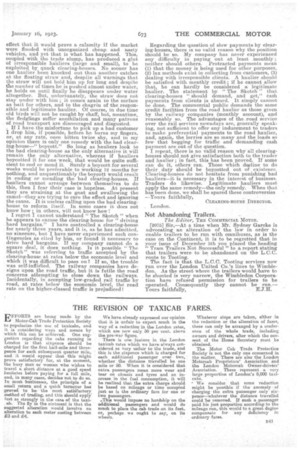THE REVISION OF TAXICAB FARES.
Page 27

If you've noticed an error in this article please click here to report it so we can fix it.
PFFORTS are being made by the Ll.,t Motor-Cab Trade Protection Society to popularize theuse -of taxicabs, and it is considering ways and means by which this can be achieved. One suggestion regarding the cabs running in London is that sixpence should be charged for the first half-mile and threepent* for each subsequent quarter mile, and it would appear that this might prove satisfactory for, at, the moment, the busy man or woman who wishes to travel a short distance at a good speed hesitates before paying for a full mile, and, in many cases, decides not to do so. In most businesses, the principle of a 6/nail return and a quick turnover has proved to be the most satisfactory. method of trading, and this should apply iust as strongly in the ease of the taxiab. The By in the ointment is that the suggested alteration would involve an alteration to each meter costing between £3 and £4. We have already expressed our opinion that it is unfair, to expect much in the way of a reduction in the London rates, which are now -only, 50 per cent, above the.pre-war figure.
There is one feature in the London taxicab rates which we have always considered as very unfair to the trade, and this is the sixpence which is charged for each additional passenger over two, whether the distance travelled be one mile or 5(1 When it is considered that extra passengers mean more wear and tear on chassis and tyres and an increase in the fuel consumption, it will be realized that the "extra charge should be based on mileage or time occupied just as is the ordinary fare for one or two passengers.
,,This would impose no hardship on the additional passengers and would do much to place the cab trade on its feet, or, perhaps we ought to say, on its wheel s.
Whatever steps are taken, either in the reduction or the alteration of fares, these can only be arranged by a conference of the whole trade, including owners and drivers, after which the consent of the Home Secretary must be obtained.
The Motor Cab Trade Protection Society is not the only one concerned in the matter. There are also the London Motercala Proprietors' Association and the London Motorcab Owner-drivers' .Association. These represent a very large proportion of London's 8,000 taxicabs.
• We consider that some reduction might be possible if the anomaly of charging the extra passenger only sixpence—whatever the distance travelled could be removed. If such a -passenger paid his just proportion according. to the mileage run, this would to a great. degree compensate for any deficiency hi ordinary fares.






























